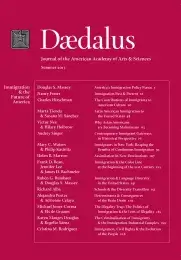Immigration, Civil Rights & the Evolution of the People
In considering what it means to treat immigration as a “civil rights” matter, I identify two frameworks for analysis. The first, universalistic in nature, emanates from personhood and promises non-citizens the protection of generally applicable laws and an important set of constitutional rights. The second seeks full incorporation for non-citizens into “the people,” a composite that evolves over time through social contestation – a process that can entail enforcement of legal norms but that revolves primarily around political argument. This pursuit of full membership for non-citizens implicates a reciprocal relationship between them and the body politic, and the interests of the polity help determine the contours of non-citizens' membership. Each of these frameworks has been shaped by the legal and political legacies of the civil rights movement itself, but the second formulation reveals how the pursuit of immigrant incorporation cannot be fully explained as a modern-day version of the civil rights struggle.
The Immigration and Nationality Act of 1965, which eliminated national-origin quotas from the code, coincided with the enactment of framework civil rights legislation. Throughout the mid- to late twentieth century, lawmakers and advocates who pressed for immigration reform formulated their ideas as extensions of the civil rights struggle.1 And generally speaking, the civil rights movement has given us the vocabulary with which we frame debates concerning justice, equality, and citizenship. Characterizing the immigration debate as a civil rights struggle therefore has strong intuitive appeal for defenders of immigrants’ rights.
But what precisely it means to connect immigration with the civil rights project is not self-evident. The immigrant population encompasses persons whose ties to the body politic vary considerably in kind. “Civil rights” is itself a term with multiple meanings. It can refer to particular legal protections against discrimination and exploitation, as well as to abstract principles of equality and anti-subordination, and it can be employed to evoke the civil rights . . .
